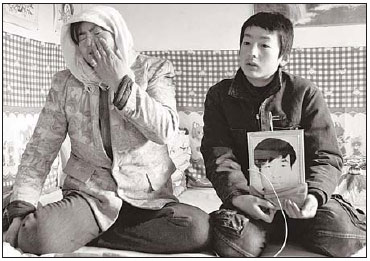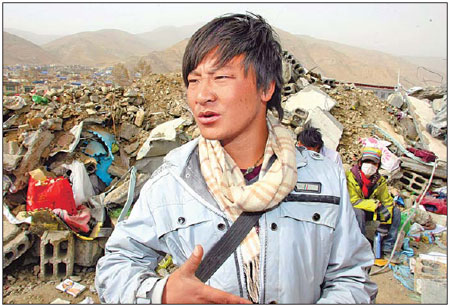Society
Covering the changing times of China
(China Daily)
Updated: 2010-12-30 07:18
 |
Large Medium Small |
From sorrow to great expectations for student
Editor's note: Zhang Long is the son of Zhang Yuesheng, a miner who died of black lung disease in 2006.
Zhang Long knows working hard at school is the only way to escape the poverty of his village, but for years the thought of going to college felt like a pipedream.
 Zhang Long holds the picture of his father, miner Zhang Yuesheng, who died of black lung disease in 2006, in this file photo. Zhang Long, 15, now studies hard at school and is sponsored by a China Daily reader. Feng Yongbin / China Daily |
Now, thanks to a kind Beijing benefactor, it could become a reality.
Zhao (he did not want to be identified), a China Daily reader, contacted the paper shortly after a report about the plight of miners in Gulang county, Gansu province. He wanted to help Zhang, 15, whose father died of black lung disease after 13 years down a gold mine.
Although the boy's education is free, Zhao sponsors him to the tune of 100 yuan ($15) a month to cover living costs. He has also promised to pay for his further education, including high school and college.
They talk on the telephone every Saturday afternoon. "He tells me how to study better and reminds me not to be too thrifty," said Zhang, who has so far received 600 yuan. His mother, Shang Huazi, said the family has really appreciated the help.
In February this year, Zhang told China Daily how he tries to comfort his mother by getting good examination scores. On the wall in his living room are certificates for winning mathematics competitions, while he was also ranked third out of 300 students in his grade at middle school.
Every weekend, he walks 8 kilometers home. He never takes a bus so as to save money.
"I will study hard and never take the road my father did," said the teenager. "The help of Zhao is definitely a driving force."
Two more black lung sufferers have died since February, leaving their families in financial and mental difficulties.
Shang now picks cotton in the Xinjiang Uygur autonomous region to make extra money and pay the 70,000-yuan debt - 20 times more than her yearly income - that was built up during her husband's treatment.
"I plan to invite Zhang to Beijing during the winter vacation and I'll show him around," Zhao told China Daily. "The only thing I want is a better life for him."
Hu yongqi
To read the original story, visit: m.yibaidns.com/cndy/2010-02/08/content_9440937.htm
Clearing away ruins for quake orphans
Gyashul Adrou escaped from his crumbling orphanage with 22 children when a 7.1-magnitude earthquake hit Qinghai province last April. Next year, he will return with 54.
 Gyashul Adrou stands among the debris of his orphanage after a 7.1-magnitude earthquake hit Qinghai province in this file photo from April 25. After a year of reconstruction efforts, he will return to the town with 54 children. Huo Yan / China Daily |
"I hope our new home will be bigger and stronger," said the 24-year-old, who has run the orphanage in the Yushu Tibetan autonomous prefecture since 2006 with his brother, Kagyu Mulan, 27.
More than 2,600 people were killed in the natural disaster, including 46-year-old volunteer Wong Fuk Wing, who died saving three children trapped in the ruins.
As word of the heroic deed quickly spread, individuals, companies and organizations rushed to comfort the orphans and offered cash donations.
However, eight months later, hardly any of the promises have been kept. "We need money and urgently," said Gyashul Adrou, whose priorities including rebuilding the orphanage in Gyegu town and supporting seven children through vocational education.
For the past five years, the orphanage, which costs 130,000 yuan ($20,000) a year to run, has largely depended on money from Kagyu Mulan's private medical clinic and a factory that produces Tibetan incense.
However, when it reopens the care home will accommodate more children, including those orphaned by the earthquake.
All 54 children have moved from tents to an orphanage in the southeastern Huangnan Tibetan autonomous prefecture, where they also attend school.
At the beginning, some of them were hesitant about going indoors. Therapists from cities arrived to give them counseling and encouraged them to retell the painful experiences to help ease the stress. However, due to culture differences, the technique did not yield much success.
Instead, they tried traditional Tibetan nomad games, which worked at relieving the trauma.
The children still feel insecure but they are getting better, said Gyashul Adrou, who explained: "For some of them, sight of a crack on the wall is still enough to make them want to live in a tent."
Others are eager to go back to Gyegu, the place where they were born and raised, but others are dreading it "because it is the place they lost their family", he said.
According to reconstruction plans for the town, the new four-story orphanage will be completed in 2011. "I hope we'll be back before next winter," added Gyashul Adrou.
Cao Li
To read the original story, visit: http://m.yibaidns.com/cndy/2010-04/30/content_9794995.htm